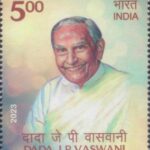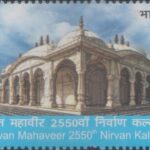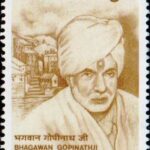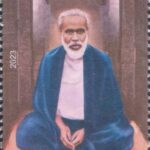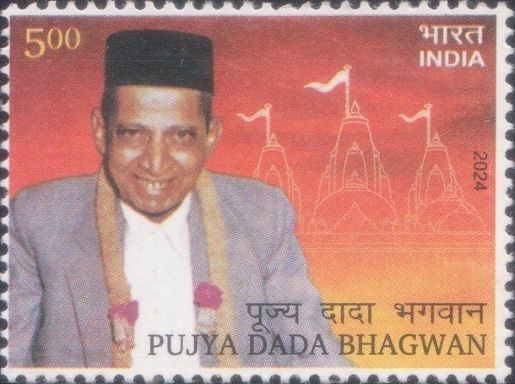
Dada Bhagwan
A commemorative postage stamp on Pujya Dada Bhagwan, founder of Akram Vignan movement :
 Issued by India
Issued by India
Issued on Nov 10, 2024
Issued for : The Department of Posts is proud to release a commemorative postage stamp honoring Dada Bhagwan. Celebrated for founding Akram Vignan, Dada Bhagwan’s teachings continue to inspire through Trimandirs, Satsang centers and dedicated volunteers. His vision of a spiritually enriched and compassionate world remains a guiding light for many, offering a direct path to self-realization and liberation.
Credits :
Stamp/FDC/Brochure/Cancellation Cachet : Smt. Nenu Gupta
Type : Stamp, Mint Condition
Colour : Multi Colour
Denomination : 500 Paise
Stamps Printed : 410000
Printing Process : Wet Offset
Printer : Security Printing Press, Hyderabad
Name : Ambalal Muljibhai Patel
Born on 7 Nov, 1908 at Tarsali, Gujarat, India
Died on 2 Jan, 1988
About :
- Ambalal Muljibhai Patel, widely revered as Dada Bhagwan, was an extraordinary spiritual teacher whose life and teachings have impacted countless individuals worldwide. Born on November 7, 1908, in Tarsali, Gujarat, India, Dada Bhagwan was endowed with a deep sense of moral integrity and a contemplative nature from a young age.
- His early life was characterized by a profound commitment to understanding the nature of existence and divinity. Raised with strong moral values by his mother, Dada Bhagwan was taught the principles of non-violence and compassion. This foundational lesson guided him throughout his life, influencing his approach to spirituality and his interactions with others.
- As a teenager, Dada Bhagwan’s spiritual quest began to take shape. At the age of thirteen, he demonstrated a remarkable insight into the nature of God. When asked by his math teacher to find the smallest indivisible number, Dada Bhagwan declared that he had discovered God—the one common, indivisible entity present in all living beings. This early revelation began his lifelong pursuit of understanding the divine essence within every individual and the world around him.
- At sixteen, Dada Bhagwan entered into marriage with Hirabaa. Despite his youth, he approached this significant life event with a contemplative mindset, recognizing the impermanence of worldly attachments. He viewed marriage as a temporary arrangement, acknowledging that one of them might eventually become a widow or widower. This perspective allowed him to fulfill his duties as a husband with love and respect while maintaining a profound detachment from worldly desires.
- Dada Bhagwan and Hirabaa faced personal tragedies when their two infant children passed away. He responded to these losses with remarkable equanimity, viewing their children as transient visitors rather than permanent attachments. Throughout his life, Dada Bhagwan demonstrated a remarkable lack of attachment to material possessions. He managed a successful construction business in partnership with others, using the profits to support charitable causes. His selfless approach to wealth and his commitment to helping those in need were central to his spiritual philosophy.
- The pivotal moment in Dada Bhagwan’s life occurred in June 1958. While sitting at a bustling railway station in Surat, Gujarat, he experienced a profound spiritual awakening. In a single hour, he attained a state of enlightenment that revealed the true nature of the universe and the self. This transformative experience led him to a clear understanding of the distinction between the Knower (the true Self) and his relative self, which he referred to as Ambalal Muljibhai Patel.
- Following this enlightenment, Dada Bhagwan dedicated his life to sharing his newfound understanding with others. He developed a spiritual science known as Akram Vignan, which offers a direct and step-less path to Self-realization and liberation (moksha). Through the practice of Akram Vignan, individuals can achieve a state of inner peace, happiness, and spiritual fulfillment.
- One of the key aspects of Dada Bhagwan’s teachings was the ceremony known as “Gnan Vidhi.” This sacred ritual was designed to impart the awareness of the real Self (the pure Soul) to seekers. During this ceremony, Dada Bhagwan addressed profound existential questions such as “Who am I? Who runs this world? What is God? What is karma? What is liberation?” His answers provided a clear and accessible understanding of these complex spiritual concepts.
- Dada Bhagwan’s teachings are renowned for their clarity and practicality. He distilled the essence of all scriptures into contemporary language that is easy to understand, experience, and apply in everyday life. His teachings cover a wide range of topics, including the science of karma, the nature of humanity, and the principles of non-conflict and adjustment. His approach provides practical solutions to common dilemmas and supports spiritual progress through right understanding and knowledge.
- In addition to his teachings, Dada Bhagwan sought to promote religious unity through his concept of the religion of the Self. He envisioned a non-sectarian Trimandir, a temple that integrates elements of Vaishnavism, Shaivism, and Jainism. The Trimandir serves as a place where individuals from different religious backgrounds can come together to seek the real Self and transcend sectarian divisions.
- To date, eighteen Trimandirs have been established, and several more are in planning or construction. These temples serve as centers for spiritual practice and community gatherings, reflecting Dada Bhagwan’s vision of fostering unity and understanding among diverse spiritual traditions.
- In 1968, a pivotal figure in Dada Bhagwan’s mission emerged: Pujya Niruben Amin (Niruma). At the age of twenty-four, Niruma, a final-year MBBS student, was deeply inspired by Dada Bhagwan’s teachings. Her yearning for spiritual realization led her to serve Dada Bhagwan and his wife Hirabaa selflessly. Over the next two decades, Niruma devoted herself to this service and played a crucial role in disseminating Akram Vignan worldwide.
- Niruma’s dedication included recording Dada Bhagwan’s speeches, ensuring that his teachings would be accessible to future generations. Her commitment to preserving and spreading Dada Bhagwan’s teachings was instrumental in the global reach of Akram Vignan. Dada Bhagwan honored Niruma with spiritual powers (siddhis) to continue imparting Self-realization to others, furthering his mission even after his passing.
- Supporting Niruma in her mission was Pujya Deepakbhai Desai, who attained Self-realization from Dada Bhagwan at the age of seventeen. Deepakbhai Desai dedicated himself to promoting Akram Vignan, balancing his spiritual mission with his mechanical engineering career until the late 1990s. His continued leadership and guidance have been vital in sustaining and expanding the teachings of Dada Bhagwan.
- Following Niruma’s passing in March 2006, Pujya Deepakbhai Desai has taken on the role of leading and guiding the science of Akram Vignan. Under his leadership, the teachings of Dada Bhagwan continue to reach an ever-growing audience, with over 1.1 million followers in India and across the globe. The teachings have inspired a diverse range of followers in countries such as Australia, the UK, the USA, Brazil, Germany, Kenya, and the UAE.
- The Dada Bhagwan Foundation, headquartered in Adalaj, Gandhinagar, Gujarat, oversees a township designed to support spiritual practice. The township includes a 15,000-seat convention center and various facilities for followers to deepen their practice and engage in community activities. Additionally, the foundation supports numerous charitable trusts that focus on medical aid, food distribution, and educational initiatives, reflecting Dada Bhagwan’s commitment to social and spiritual welfare.
- Text : Based on information provided by the proponent.


